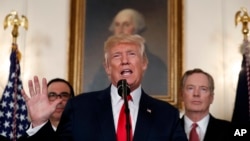A decision by the United States to investigate China’s trade practices is a unilateralist “baring of fangs” that will hurt both sides, China’s state news agency Xinhua said Tuesday.
U.S. President Donald Trump on Monday authorized an inquiry into China’s alleged theft of intellectual property that administration officials said could have cost the United States as much as $600 billion.
U.S. Trade Representative Robert Lighthizer will have a year to look into whether to launch a formal investigation of China’s trade policies on intellectual property, which the White House and U.S. industry lobby groups say are harming U.S. businesses and jobs.
“While it is still too soon to say that the United States intends a showdown with China on trade, it is no exaggeration that the latest baring of fangs on Washington’s part against China, like all the other unilateral moves by Washington, will hurt not only China, but the United States itself in the long run,” Xinhua said.
Xinhua said while Chinese exporters could be the first to suffer from trade sanctions, the pain would soon spread to U.S. industries and households, adding that China was willing to resolve any disputes between the two sides through dialogue.
The investigation is likely to cast a shadow over U.S. relations with China, its largest trading partner, just as Trump is asking Beijing to put more pressure on North Korea to give up its nuclear program.
Ken Jarrett, president of the American Chamber of Commerce in Shanghai, said in a statement Tuesday that trade and North Korea should not be linked, and said the investigation was a sign of growing U.S. discontent with Chinese trade practices.
“The president’s executive order reflects building frustration with Chinese trade and market entry policies, particularly those that pressure American companies to part with technologies and intellectual property in exchange for market access,” he said. “Chinese companies operating in the United States do not face this pressure.”
“We support actions that recognize the importance of U.S.-China commercial ties but which also encourage progress toward a more equitable trading relationship,” he said.





